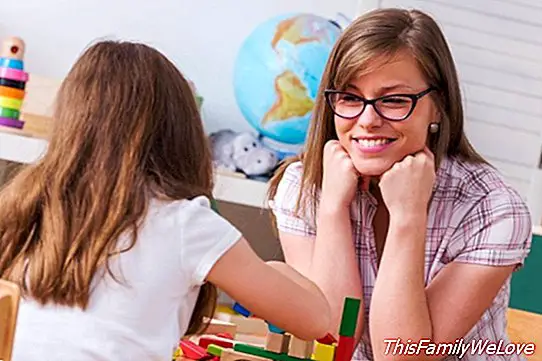The role of parents in the children's game

The benefits of the game in learning they do not imply that it is an activity exclusively for school use. The child plays constantly, while on the way to school or shopping is entertained kicking a stone or walking on the curbs, in the waiting room of the doctor with games of palms.
Parents have a fundamental role in the children's game. The game is a very useful way to dedicate the time they need to strengthen emotional ties and we can transmit our knowledge and help us understand them better. It also serves to educate them in the functioning of society since the family is the first social group of the child and its main educator. This game time will give you security, strengthen your self-esteem and contribute to your happiness.
If we achieve understand the game as a fundamental activity in the development of the child, we will see the need to promote and enhance it in the time we spend with our children. We must offer them a variety of games that give them time to be with other children, alone and with their family. It must occur in varied contexts, that is, both outdoors and indoors. Match movement games with attention games, skill games * So that you can provide the skills, attitudes and information necessary for their growth and development.
Ideas for parents: understand the value of the game
By knowing better the value of the game, we understand that learning in young children can not be done by sitting for hours in a chair, bombarding them with information. They do not have the same ability that older people have to learn. Now is the time to develop essential skills for the acquisition of more complex later learning. His little head and his being are anxious to know, to learn, to know the world around them but their maturity will only allow them to learn in a practical way, through experiences, through all the senses, and will only attract their attention what has a interest for him.
Let the children develop step by step, respecting the maturing rhythms of each one and the activities that correspond to each moment of his life and to his maturity. There is no need to accelerate times because it will cause difficulties in present and future learning.
That's why, when we pick up our son from school and he says "Today I played", we would smile satisfied and satisfied with the day so profitable that they have had valued the ability to learn while having fun.
Children's play and learning
The young children learn in a globalized way, learning is not structured in subjects. Through a common thread that is able to awaken the interest of the child, all the necessary learning is integrated for its development.
While the child plays and has fun, is not aware that he has worked his gross and fine psychomotor skills, necessary for literacy, has learned notions of mathematical logic such as sizes, shapes, numbers, concepts more and less, much and little, classifications , seriousness, approximation to addition and subtraction. He has learned new vocabulary, has expressed feelings that help him to know and regulate his emotions.
By knowing better the value of the game, we understand that learning in young children can not be done by sitting for hours in a chair, bombarding them with information.
If we can understand the game as a fundamental activity in the development of the child, we will see the need to encourage and enhance it with ideas to play with children and participate in their games. We must offer them a variety of games that give them time to be with other children, alone and with their family.
Misconceptions about the game
- Use the game as an exclusive leisure activity.
- Overstimulate the child with games labeled as educational, believing that we will provide them with more intelligence.
- Differentiate games by sex.
- Limit the game to toys.
Psychomotor games
The child satisfies his need for physical exercise and movement, develops his motor possibilities, learns to control his body and lays the foundations for later learning such as reading and writing. They can be gAtheist, march, ride, tricycle, bicycle, run, jump, play rubber, walk on the curb, ball games, hoops, cartwheels ... The games of fine motor skills consist in stringing, modeling, trimming, modeling ...
Social and emotional game
These games favor socialization because they train the social skills, they force to know the norms of coexistence, to assume rules, to express feelings, to regulate emotions ... The social game is given from the first moment in the life of the child when interacting with his parents to through daily care and evolves progressively when playing with other children and with other adults.
Cognitive games
They encourage thought, develop memory, concentration, attention, perception, imagination and creativity. They include puzzles, puzzles, sudoku, games to find differences, find couples, card games, hot-cold, memorize poetry, paint, make artistic compositions ...
Electronic games
We can not ignore these games because they are part of the current life of children. There is no doubt that they also contribute to their intellectual development, work coordination and reaction time. It is beneficial if played sparingly. Playing for a long time can cause obsession in the child and affect his social-emotional development.
The time allocated to electronic games should not exceed the time that the child devotes to the rest of the games.
Cristina Palacios Hernando. Pedagogue




